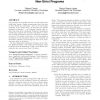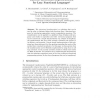87 search results - page 4 / 18 » Functions and Lazy Evaluation in Prolog |
103
click to vote
ICFP
2003
ACM
16 years 1 months ago
2003
ACM
Lazy programs are beautiful, but they are slow because they build many thunks. Simple measurements show that most of these thunks are unnecessary: they are in fact always evaluate...
ECOOP
2001
Springer
15 years 5 months ago
2001
Springer
Abstract. We introduce the design of Mondrian, a functional scripting language for glueing together components on the .NET platform. Mondrian is monadic statement centric with pure...
222
click to vote
ICFP
2009
ACM
16 years 1 months ago
2009
ACM
Functional logic programming and probabilistic programming have demonstrated the broad benefits of combining laziness (non-strict evaluation with sharing of the results) with non-...
156
click to vote
CORR
2004
Springer
15 years 1 months ago
2004
Springer
Many functional logic languages are based on narrowing, a unification-based goal-solving mechanism which subsumes the reduction mechanism of functional languages and the resolutio...
MICS
2008
15 years 1 months ago
2008
The intensional transformation is a technique that can be used in order to eliminate higher-order functions from a functional program by introducing appropriate context manipulatio...


